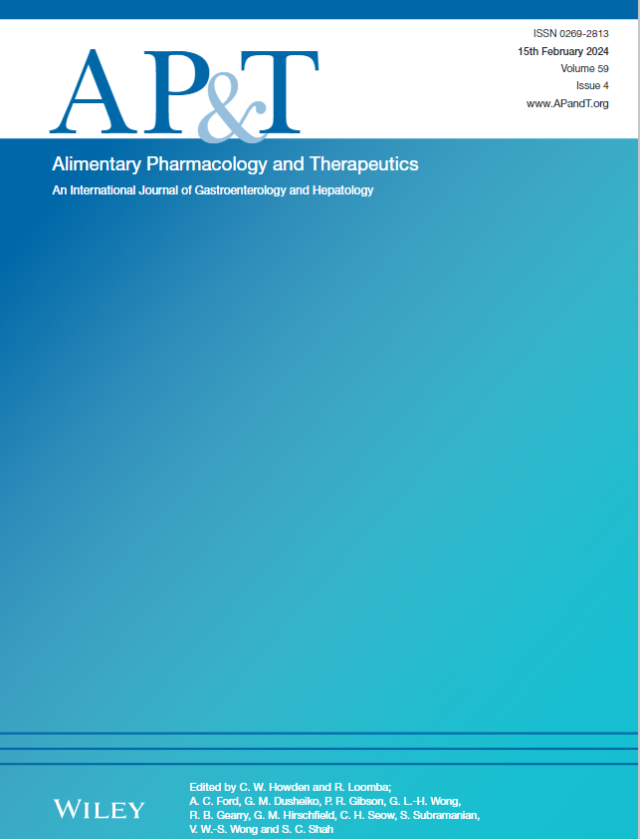Outcome After Surgery for Colon Cancer in a National Cohort of Patients With and Without Inflammatory Bowel Disease.
IF 6.7
1区 医学
Q1 GASTROENTEROLOGY & HEPATOLOGY
引用次数: 0
Abstract
AIMS To estimate the impact of inflammatory bowel disease on survival in a national cohort of patients following surgical resection for colon cancer, and to describe the surgical treatment of colon cancer in patients with inflammatory bowel disease. METHODS Using the Colorectal Cancer Database, we included all patients ≥ 15 years of age with a diagnosis of stages I-III colon cancer treated with curative intent 2007-2021. We used Cox proportional hazards models to compare overall survival, recurrence-free survival and cancer-specific survival between patients with and without inflammatory bowel disease. Multivariable analyses were adjusted for sex, age, date of colon cancer surgery, Charlson Comorbidity Index and primary sclerosing cholangitis. RESULTS Among 35,640 patients with colon cancer, 675 (1.9%) had inflammatory bowel disease. Median age at colon cancer diagnosis was 68 years in patients with inflammatory bowel disease and 75 in those without; proportions of male sex were 55% and 49%, respectively. In patients with inflammatory bowel disease, surgical therapy was proctocolectomy in 10%, subtotal colectomy in 29% and segmental resection in 61%. From adjusted analyses, patients with inflammatory bowel disease had worse overall survival (HR = 1.38; 95% CI: 1.21-1.57), recurrence-free survival (HR = 1.33; 95% CI: 1.18-1.50) and cancer-specific survival (HR = 1.46; 95% CI: 1.23-1.73) than patients without. CONCLUSION Inflammatory bowel disease negatively influences the prognosis of colon cancer. Proctocolectomy was performed only in a minority of those with inflammatory bowel disease. Outcomes need to be improved in patients with inflammatory bowel disease developing colon cancer.一项有和没有炎症性肠病的国家队列结肠癌手术后的结果
目的评估一项全国队列结肠癌手术切除后炎症性肠病对患者生存的影响,并描述炎症性肠病患者结肠癌的手术治疗。方法:使用结直肠癌数据库,我们纳入了2007-2021年所有年龄≥15岁、诊断为I-III期结肠癌且有治愈意图的患者。我们使用Cox比例风险模型来比较炎症性肠病患者和非炎症性肠病患者的总生存率、无复发生存率和癌症特异性生存率。多变量分析调整了性别、年龄、结肠癌手术日期、Charlson合并症指数和原发性硬化性胆管炎。结果35,640例结肠癌患者中,有675例(1.9%)患有炎症性肠病。有炎症性肠病患者诊断结肠癌时的中位年龄为68岁,无炎症性肠病患者的中位年龄为75岁;男性的比例分别为55%和49%。在炎症性肠病患者中,手术治疗为直结肠切除术(10%)、结肠次全切除术(29%)和节段性切除术(61%)。从调整分析来看,炎症性肠病患者的总生存期较差(HR = 1.38;95% CI: 1.21-1.57),无复发生存率(HR = 1.33;95% CI: 1.18-1.50)和癌症特异性生存率(HR = 1.46;95% CI: 1.23-1.73)。结论炎症性肠病对结肠癌预后有负面影响。仅在少数炎症性肠病患者中行直结肠切除术。炎症性肠病并发结肠癌患者的预后需要改善。
本文章由计算机程序翻译,如有差异,请以英文原文为准。
求助全文
约1分钟内获得全文
求助全文
来源期刊
CiteScore
15.60
自引率
7.90%
发文量
527
审稿时长
3-6 weeks
期刊介绍:
Alimentary Pharmacology & Therapeutics is a global pharmacology journal focused on the impact of drugs on the human gastrointestinal and hepato-biliary systems. It covers a diverse range of topics, often with immediate clinical relevance to its readership.

 求助内容:
求助内容: 应助结果提醒方式:
应助结果提醒方式:


